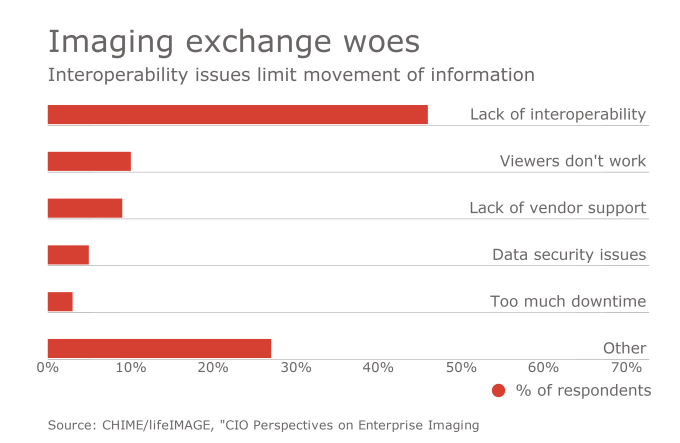Cerner
See the following -
IBM, Epic Unveil Advisory Group As They Vie For Big Military EHR Contract
IBM Corp. and Epic Systems Corp., likely hoping to show why their joint bid should win the Defense Department's $11 billion, 10-year EHR contract, Wednesday unveiled a 17-person group they've assembled to help advise the department and guide it through implementation if they win the work. Read More »
- Login to post comments
Image Sharing Grows in Importance
 Despite the importance of developing an enterprise medical imaging approach, the strategy requires the easy exchange of images, and achieving that interoperability is a major challenge, according to results of a recent survey. Still, more than half of 100 surveyed IT leaders in healthcare organizations say their facility has an enterprise imaging strategy—a major component supporting the move to interoperability—and 54 percent say specialists at their facility can electronically exchange images with patients, providers and referring sites...
Despite the importance of developing an enterprise medical imaging approach, the strategy requires the easy exchange of images, and achieving that interoperability is a major challenge, according to results of a recent survey. Still, more than half of 100 surveyed IT leaders in healthcare organizations say their facility has an enterprise imaging strategy—a major component supporting the move to interoperability—and 54 percent say specialists at their facility can electronically exchange images with patients, providers and referring sites...
- Login to post comments
In-Depth: All the News from the Connected Health Conference 2016
This week, the Connected Health Conference in National Harbor, Maryland brought together stakeholders and thought leaders in digital and connected health. MobiHealthNews covered the two-day event this week -- links to our coverage from Monday and Tuesday are at the bottom of this roundup... In a panel moderated by Dr. Joe Kvedar, the VP of Connected Health at Partner’s Healthcare, Alden Doerner Rinaldi, medical director at Mount Auburn Hospital and Ronan Wisdom, global lead for connected health at Accenture, talked about how the role of digital tools is changing in healthcare...
- Login to post comments
Intermountain Healthcare Partners With Cerner To Provide Clinical Governance For Leidos Partnership For Defense Health
Cerner today announced a strategic agreement with Intermountain Healthcare to provide clinical governance of solutions and workflow to be proposed for the Department of Defense's Healthcare Management System Modernization (DHMSM) initiative. Cerner is a member of the Leidos Partnership for Defense Health, an alliance that includes Leidos, the domain experts in Military Health, and Accenture, a global IT and management consulting company and one of the largest EHR systems integrators in the world...
- Login to post comments
Interoperability: Can It Really Happen In 10 Years?
With electronic health records now in place among hospitals and medical practices, the Office of the National Coordinator for Health IT embraced its new mandate in 2014: getting them to talk to each other...
- Login to post comments
Is HIT Interoperability In The Nature Of Healthcare?
The proprietary business model makes the vendor the single source of HIT for hospital clients. Complexity and dependence are baked into both solutions and client relationships, creating a “vendor lock” scenario in which changing systems seems almost inconceivable.
Read More »
- Login to post comments
Is The EMR Market In The US Heading For The Cliff?
The market for electronic medical record (EMR) systems in the United States appears to have reached its tipping point with the market expected to begin its decline in 2013, according to Millennium Research Group (MGR).
- Login to post comments
IT Blamed In Athens GA Cerner EHR Debacle
Who's to blame when EHR implementations go south? There's often enough fault to go around. But when the fallout is bad enough, sometimes self-interested parties are all too ready to point fingers. In late May, we covered the story of a $31 million Cerner rollout at Athens Regional Health System in Georgia that didn't go as planned.
- Login to post comments
JASON Task Force Says Stage 3 Must Be Less Stringent
Meaningful use stages 1 and 2 have failed to foster interoperability "in any practical sense." That's the contention of Micky Tripathi, CEO of the Massachusetts eHealth Collaborative, and David McCallie, senior vice president of medical informatics at Cerner, co-chairs of ONC's joint HIT Policy and Standards Committee JASON task force...
- Login to post comments
JASON Task Force To ONC: Consider Delaying MU Stage 3 Incentives
The Office of the National Coordinator for Health IT should narrow Meaningful Use Stage 3 to focus on interoperability and "assertively monitor" the transition to public APIs but implement only "non-regulatory steps" to catalyze the transition, according to ONC's JASON task force...
- Login to post comments
Kansas Hospital’s Failed EMR Project Shows Peril of Vendor Relations Gone Bad
Girard Medical Center, a rural hospital in Kansas which services mainly uninsured patients and the elderly, wanted an electronic medical record system to better share information with its clinic offshoots and to claim federal incentives. But a year-and-a-half and more than a million dollars later, the hospital says it’s no closer to having electronic medical records, and is blaming its vendor for the failure of the project. Read More »
- Login to post comments
Leidos Team Touts Interoperability In Military EHR Bid
Time is running out for vendors to submit bids on the planned $11 billion, 10-year contract to deliver an electronic health records system to the Defense Department. The DOD Healthcare Management System Modernization (DHMSM -- pronounced "dim sum") is an ambitious plan to transform the delivery of care to the 9.6 million active-duty service members, their dependents, retirees and others...
- Login to post comments
M&A Can Be Hazardous To Health IT
Mergers and acquisitions (M&A) can be hazardous to a company's health, industry experts often warn. In the realm of health IT, this caveat has proved no exception. Read More »
- Login to post comments
Major Players Bid For Slice Of Federal Health Records Pie
Four teams of contractors so far have indicated they want in on the DoD's massive electronic health records program. While each of the teams presents formidable resources in healthcare IT, to some degree no group has a complete, ready-to-go, solution, said IDC's Scott Lundstrom...
- Login to post comments
Mortal Coils: Why We Must Stop Tolerating Failing Health Tech
 Today, data are scattered across thousands of database tables within any single electronic medical record (EMR) system, but also across dozens of other systems that hold pharmacy data, imaging data, insurance data, laboratory data, etc. Pretty much none of it is available on demand in any given clinical setting. The inevitable result of this disconnected galaxy of data "black holes" is mistakes, or if not outright mistakes, well-intentioned missteps based on lack of background data within the acute-care setting.
Today, data are scattered across thousands of database tables within any single electronic medical record (EMR) system, but also across dozens of other systems that hold pharmacy data, imaging data, insurance data, laboratory data, etc. Pretty much none of it is available on demand in any given clinical setting. The inevitable result of this disconnected galaxy of data "black holes" is mistakes, or if not outright mistakes, well-intentioned missteps based on lack of background data within the acute-care setting.
- Login to post comments